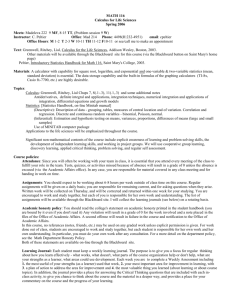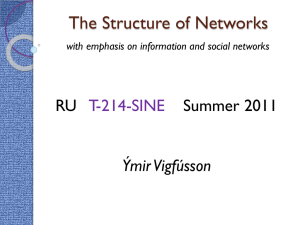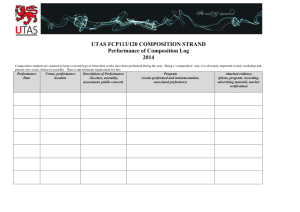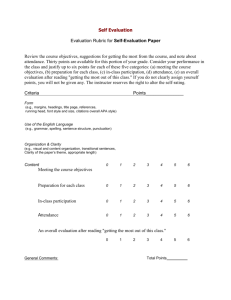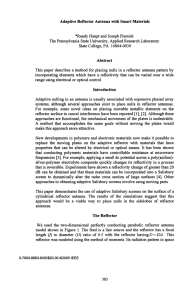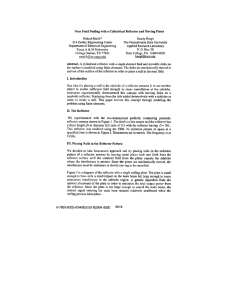Math 251/Buad427 - Saint Mary's College
advertisement
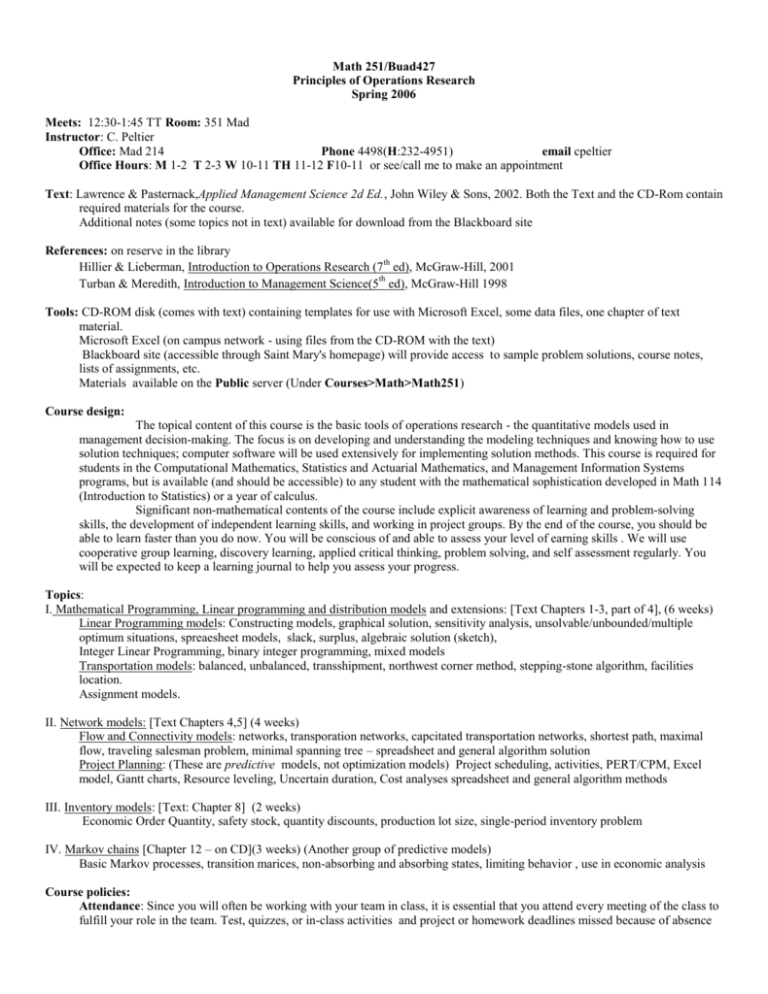
Math 251/Buad427 Principles of Operations Research Spring 2006 Meets: 12:30-1:45 TT Room: 351 Mad Instructor: C. Peltier Office: Mad 214 Phone 4498(H:232-4951) email cpeltier Office Hours: M 1-2 T 2-3 W 10-11 TH 11-12 F10-11 or see/call me to make an appointment Text: Lawrence & Pasternack,Applied Management Science 2d Ed., John Wiley & Sons, 2002. Both the Text and the CD-Rom contain required materials for the course. Additional notes (some topics not in text) available for download from the Blackboard site References: on reserve in the library th Hillier & Lieberman, Introduction to Operations Research (7 ed), McGraw-Hill, 2001 th Turban & Meredith, Introduction to Management Science(5 ed), McGraw-Hill 1998 Tools: CD-ROM disk (comes with text) containing templates for use with Microsoft Excel, some data files, one chapter of text material. Microsoft Excel (on campus network - using files from the CD-ROM with the text) Blackboard site (accessible through Saint Mary's homepage) will provide access to sample problem solutions, course notes, lists of assignments, etc. Materials available on the Public server (Under Courses>Math>Math251) Course design: The topical content of this course is the basic tools of operations research - the quantitative models used in management decision-making. The focus is on developing and understanding the modeling techniques and knowing how to use solution techniques; computer software will be used extensively for implementing solution methods. This course is required for students in the Computational Mathematics, Statistics and Actuarial Mathematics, and Management Information Systems programs, but is available (and should be accessible) to any student with the mathematical sophistication developed in Math 114 (Introduction to Statistics) or a year of calculus. Significant non-mathematical contents of the course include explicit awareness of learning and problem-solving skills, the development of independent learning skills, and working in project groups. By the end of the course, you should be able to learn faster than you do now. You will be conscious of and able to assess your level of earning skills . We will use cooperative group learning, discovery learning, applied critical thinking, problem solving, and self assessment regularly. You will be expected to keep a learning journal to help you assess your progress. Topics: I. Mathematical Programming, Linear programming and distribution models and extensions: [Text Chapters 1-3, part of 4], (6 weeks) Linear Programming models: Constructing models, graphical solution, sensitivity analysis, unsolvable/unbounded/multiple optimum situations, spreaesheet models, slack, surplus, algebraic solution (sketch), Integer Linear Programming, binary integer programming, mixed models Transportation models: balanced, unbalanced, transshipment, northwest corner method, stepping-stone algorithm, facilities location. Assignment models. II. Network models: [Text Chapters 4,5] (4 weeks) Flow and Connectivity models: networks, transporation networks, capcitated transportation networks, shortest path, maximal flow, traveling salesman problem, minimal spanning tree – spreadsheet and general algorithm solution Project Planning: (These are predictive models, not optimization models) Project scheduling, activities, PERT/CPM, Excel model, Gantt charts, Resource leveling, Uncertain duration, Cost analyses spreadsheet and general algorithm methods III. Inventory models: [Text: Chapter 8] (2 weeks) Economic Order Quantity, safety stock, quantity discounts, production lot size, single-period inventory problem IV. Markov chains [Chapter 12 – on CD](3 weeks) (Another group of predictive models) Basic Markov processes, transition marices, non-absorbing and absorbing states, limiting behavior , use in economic analysis Course policies: Attendance: Since you will often be working with your team in class, it is essential that you attend every meeting of the class to fulfill your role in the team. Test, quizzes, or in-class activities and project or homework deadlines missed because of absence will result in a grade of 0 unless the absence is excused (via the Advising office). In any case, you are responsible for material covered in any class meeting and for handing in work on time. Assignments: You should expect to be working about 6-8 hours per week on this course outside of class. There will be a reading assignment to be completed before each class meeting - you will have trouble following the class if you do not do the reading. Written assignments (problems, computer exercises) will be due at the next class meeting, but may be handed in by the next morning with only a small penalty. Written work will be collected, graded, and returned as an aid to your study. I encourage you to work together to learn the material, and to learn to use the software - but you must do your own work. Copying of results is never acceptable. In-class activities, and the assessment by the group, are due at the stated time (usally the end of the class period). Rather than collect all journals every week, I will read the learning journal from the reflector in each group following the week in which she was the reflector. You will be assigned two team projects involving use of modeling techniques from the course. Learning Journal: Each student must keep a weekly learning journal. The purpose is to give you a focus for regular thinking about how you learn effectively - what works, what doesn't, what parts of the course organization help or don't help, what are your strengths as a learner, what areas could use development. Each week you are to complete a Weekly Assessment including 1. the most useful of your strengths (as a learner) used that week, 2. your most important area for improvement in learning, with 3. a plan of action to address the area for improvement and 4. the most valuable thing you learned (about learning or about the course content). In addition, the journal provides a place for answering the Critical Thinking questions that are included with each in-class activity, to give you chance to think about the course and the material in a deeper way, and provides a place for your commentary on the course and the progress of your learning. Leave space for instructor feedback with each week's entry. Feel free to add other related materials, comments and reflections to your learning journal. If you wish, you may use the outline page in the Course Documents area of the CourseInfo site. I will collect the reflector's learning journal the first class following the week in which she is the reflector. There is a template which you can use at http://www.saintmarys.edu/~cpeltier/Teamdocs/jrnl.doc (available also through the Blackboard site) Team Participation: There is a focus on working in teams in this course. A good portion of your working time - including some in-class time for learning activities - will be spent working with your team. You are expected to attend all sessions scheduled by your team. With your project report each team must include an effort report detailing each team member's actual contributions. In-class learning activities: There will be a number of in-class learning activities (about one a week) to be carried out in your learning teams. Each team member will have a specific role [see below] to play in performing this activity, and the team will present a report and written work at the end of the activity. Each activity will also include several critical thinking questions [going beyond the specific task of the activity] to be answered by each team member in her learning journal. At the end of the activity, the team will hand in a report containing (at least) 1. table of contents(with heading showing date, team name,members & roles, activity) 2. recorders report (including any written work products) 3. reflector's report (See Reflector's role description below, for content of this report) 4. Team's grade (0.0-5.0) for their teamwork on the activity (Based on success in completing the learning task and on functioning of the team) If I agree with your self-assigned grade, I will double it; otherwise I will also assign a grade on the 0-5 scale and the team’s grade will be the sum of these. If the self-assigned grade is inflated, there will be a penalty taken in my grade. Grading: Two in-class tests (2/21 and 3/30) Final examination (5/11 10:30) Daily (individual) homework Learning journal (individual) In-class activities (team) Projects(team) (2/28 and 4/6) 30% 15% 15% 5% 15% 20% The grading scale is based on: 60% < D < 70% < C < 80% < B < 90% < A, with + and - grades occupying the top and bottom 2% of the ranges (No A+ or D- grades). Academic honesty policy: Academic honesty policy: You should read the college's statement and policy on academic honesty printed in the student handbook (you are bound by it even if you don't read it) Any violation will result in a grade of 0 for the work involved and a note placed in the files of the Office of Academic Affairs. A second offense will result in failure in the course and notification to the Office of Academic Affairs. In this course, no assistance (notes, friends, etc.) is permitted on any graded work unless explicit permission is given. For work done out of class, students are encouraged to work and study together, but each student is responsible for her own work and her own understanding. In particular, you must do your own work after any consultation. For more detail on the department policy, see http://www.saintmarys.edu/~math/honguide.html Team Roles In order to give attention to the learning and working process, there are four roles that must be filled in each team activity. Teams should rotate these roles weekly so that each member gains experience with each role. Team Captain - Performs the Spokesperson/Planner role in a 3 person team. -Keeps the group on task and makes sure everyone is having fun; -Ensures that the group accomplishes the task within the allotted time; -Encourages full participation by each group member; -Ensures that all team members can articulate what has been learned; -Ensures that the other group members perform within their roles; -Represents the group in all interactions with the instructor. Recorder -Records group roles at beginning of activity; -Takes notes of important points which come up during the activity; -Ensures her words accurately reflect group consensus. Checks wording with the group when necessary; -Prepares a written report of the group's decisions and discoveries during each activity (handed in with each activity). Reflector -Watches group process: what is going well, what is needs improvement, what can be done to improve the process (use constructive criticism); -Writes down and reports orally her observations to the group when needed to help make the work go forward and help the group to function better. -Prepares a written report and checks it out with the group during the end-of-activity assessment period. This will include: 1. Role [position], strength and area for improvement of each team member; 2. Greatest strength and area most in need of improvement for the team as a whole [as shown in this work] -Reminds the team leader of her duties if necessary. Spokesperson/Technology Specialist/Planner -Comes up with a plan for accomplishing the group task. -Retrieves information from various sources (computer, text, manuals...). -Encourages risk-taking and critical thinking. -Synthesizes other members' directions and reports results. -Gives the group report orally at the end of the activity. Note that all group members must fully participate in the learning exercise while performing their roles. All must really want the team to succeed. Performance criteria for team roles Team Captain 1.Keep the process enjoyable and rewarding; 2.Keep all team members performing within roles; 3.Keep the team focused; 4.Keep all team members involved in the problem-solving process; 5.Ensure that all team members can articulate what has been learned; 6.Time management; 7.Stress management; 8.Active learner and contributor; 9.Overall team performance; 10.Plan time for various tasks; 11.Set up meeting times and places, meeting length, deadlines; 12.Act as the objective internal mediator when interpersonal conflicts arise; Recorder 1.Record names and group roles at beginning of class; 2.Record instructions at beginning of task; 3.Quality of listening and recording skills; 4.Legibly document the process, group decisions, and discoveries in the Recorder’s Journal; 5.Active learner and contributor; 6.Ability to control information flow; 7.Ability to re articulate concepts in alternative forms; 8.Ability to integrate and synthesize multiple ideas; 9.Ability to diagram and draw pictures; 10.Create and communicate algorithms; 11.Prepare the report for handing in at end of class; Reflector 1.Ability to rephrase or reframe evaluations into constructive criticism; 2.Observation skills; 3.Reports strength, area for improvement, and insight in the Reflector's Journal; 4.Provide information about group interactions and process; 5.Active learner and contributor; 6.Intervene with observations about the process and strategies for change; 7.Remind team leader of duties; 8.Aquires sufficient evidence of behaviors and documentation to permit fair judgments to be made in the event of mediation and conflict resolution. Spokesperson/Technology Specialist/Planner 1. Listening and communication skills; 2. Observation skills; 3. Experimental skills 4. Retrieving information from various sources; 5. Active learner and contributor; 6. Planning and management skills; 7. Critical thinking; 8. Collaborating; 9. Synthesizing; 10. Risk taking; 11. Computer skills; 12. Giving oral reports;
